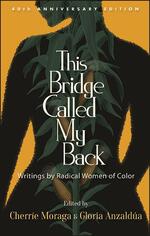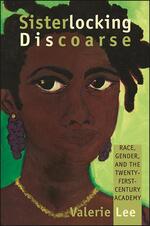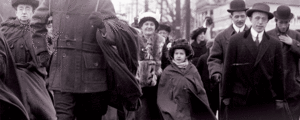
A Long Shelf Life
Rebecca Colesworthy is a Senior Acquisitions Editor with SUNY Press
Acquiring books in Women’s and Gender Studies at SUNY Press feels like a homecoming of sorts. In college, approximately one thousand years ago, I majored in both English and Women’s Studies. After graduating, I stayed in town and worked as a research assistant for three professors affiliated with the program to whom a friend referred as “the feminist triumvirate.” I then moved to New York City where I got a job at a small feminist nonprofit organization called the National Council for Research on Women (NCRW), a consortium of Women’s and Gender Studies departments and centers. My time there was fairly short—less than two years before I moved upstate for grad school—but these thousand years later I continue to stay in touch with my former colleagues. And the people and writing I first encountered in college continue to shape my thinking and make real-life cameos.
It was as an undergrad in Women’s Studies that I first read excerpts from the classic anthology This Bridge Called My Back: Writings by Radical Women of Color, edited by Cherríe Moraga and Gloria Anzaldúa, which just celebrated its fortieth anniversary and is routinely among our bestsellers. Bridge is reflective of our broader strength in Black and women of color feminisms, a strength sure to be deepened by our new series in Black Women’s Wellness, headed by Stephanie Y. Evans. In addition to being a prolific SUNY Press author, Stephanie forever won me over by bringing her own soundtrack—Janelle Monáe’s Dirty Computer—to play during a book signing at the NWSA conference in Atlanta. Stephanie also edited the most recent issue of Palimpsest: A Journal on Women, Gender, and the Black International focused on Black women’s experiences in academic leadership positions. Race, gender, and the twenty-first-century academy are also the focus of Valerie Lee’s Sisterlocking Discoarse, the latest title in Feminist Criticism and Theory, one of our longest running series and a force in the field for over thirty years.
When Valerie introduced herself to me in the exhibit hall at the MLA convention a few years ago, her name was familiar, in part because of her work in literary studies, but I also had a hunch. In Valerie’s book, she writes about her experience chairing three (yes, three!) departments at OSU, including Women’s Studies. I knew their Women’s Studies department was a member of NCRW, where I had worked. My suspicion was right: We overlapped! Valerie was Chair of Women’s Studies during the two years I was responsible for tasks like keeping member center information up-to-date on our website.
One of the first things I did after I started at SUNY Press in 2017 was reach out to my former boss at NCRW to let her know about my new role, the Press’s strengths, and my interests. That exchange eventually led to a meeting with anthropologist Tami Navarro, who has just published her first book with us, Virgin Capital, on the gendered and racialized effects of US financial services companies in the US Virgin Islands.
I’m resisting using the business-speak here and calling my former boss a “connection,” though of course she is. Among other things, my background in Women’s and Gender Studies helped teach me early on to be critical of the systems of power that turn relationships into connections—into things that are unevenly distributed along lines of race, class, and gender, into a form of capital to be traded. But these systems are never the whole story. Other worlds are possible. That, too, is one of the lessons of Women’s and Gender Studies and of books like Bridge, Sisterlocking Discoarse, and Virgin Capital.
I often say that as an editor I work with people as much as, if not more than, I work with texts. Relationships are the cornerstone of editorial work. Like the books born of them, the most meaningful relationships have a long, long shelf life.
Rebecca Colesworthy is a Senior Acquisitions Editor with SUNY Press and author of Returning the Gift: Modernism and the Thought of Exchange from Oxford University Press. Her areas of acquisition include African American Studies (Humanities); Education (Higher Education, Multicultural, and Social Justice); Indigenous Studies; Latin American, Latinx, and Iberian Studies; Literary and Cultural Studies; Queer Studies; Women’s and Gender Studies.




